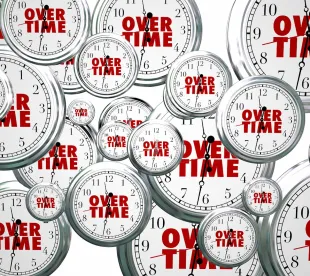To properly calculate the overtime rate for a non-exempt employee, employers must first calculate the “regular rate of pay.” Under federal law, and the laws of most states, the regular rate is determined by dividing the employee’s total weekly remuneration (except for a handful of categories that are specifically excluded, such as gifts and payments for non-working hours) by the total number of hours actually worked by the employee that week. But certain states, including California, require a different calculation—one that, depending on the nature of the compensation, can only be divided by some, but not all, of the total hours worked in the week.
In this regard, California law distinguishes between “flat-sum bonuses” and “production bonuses,” both of which may be paid on a weekly basis. As we’ve discussed previously, the California Supreme Court, in its 2018 decision in Alvarado v. Dart Container Corporation of California, held that when calculating the regular rate for a flat-sum bonus (e.g., an attendance bonus), the employer should divide the bonus solely by the employee’s non-overtime hours in the week. By contrast, and consistent with the federal rule, a production bonus—i.e., a bonus that varies based on output or hours worked—can be divided by all hours worked in the week (both overtime and non-overtime) to arrive at the regular rate. Alvarado left open the question of how to apply these principles to other forms of compensation.
Earlier this month, in its decision in Bowen v. Target Corp., the Ninth Circuit examined how to calculate the regular rate for shift differentials and holiday premiums (collectively called shift premiums). The plaintiffs in Bowen argued that shift premiums should be treated the same as flat-sum bonuses—i.e., that the denominator in the regular rate equation should be the total non-overtime hours worked, and not all hours worked. The Court of Appeals rejected this argument, noting that—unlike flat-sum bonuses, which are not directly impacted by the number of hours worked in a week—shift premiums directly correlate to the total number of weekly hours worked and will necessarily increase as an employee works overtime. They are therefore properly viewed as being paid in respect of all weekly hours worked, and not merely in respect of non-overtime hours.
Although Bowen is unpublished, the well-reasoned decision may provide guidance to California employers and, hopefully, other courts.
David Gobel also contributed to this article.





 />i
/>i
